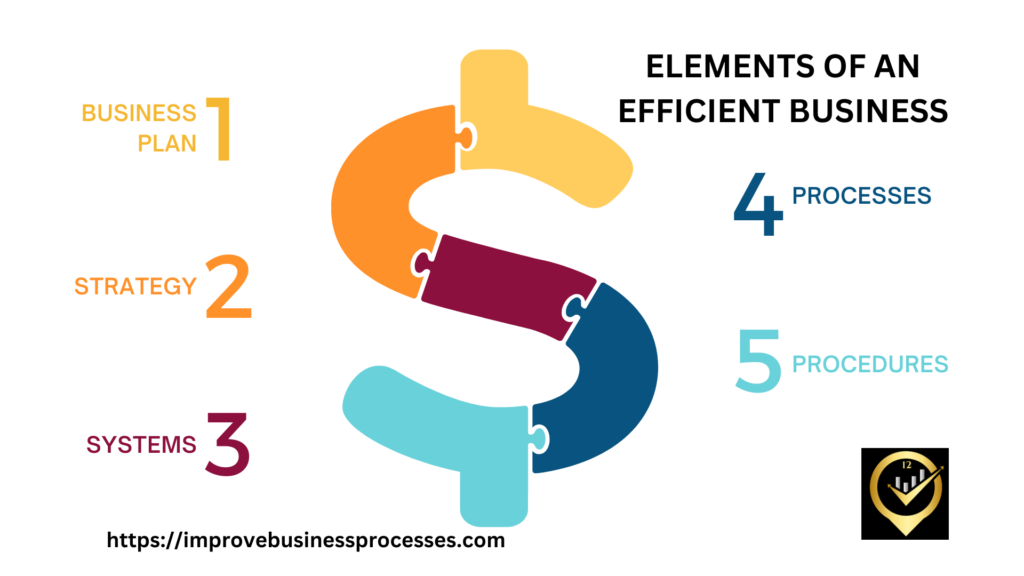Although all businesses are different, what are small business must haves to be successful? Money is important but without essential systems, struggle, frustration and overwhelm are the end game!
This article looks at 8 essential systems that EVERY business absolutely must have to function efficiently and explains why. Without these systems in place, no small business owner can be successful.
Understanding Systems

When many small business owners hear the word “SYSTEM”, they usually think that it means the procedures they use to run the business, however we need to put it in perspective the business plan. There are 5 components that work together for the success. of the business.
A business plan is the roadmap for a business. It has the mission, vision and the goals.
A strategy is the high level plan to achieve the goals.
Systems are a set of integrated processes, procedures, work instructions to create an outcome in a predictable manner.
Processes are a series of steps taken to achieve a specific outcome.
Standard operating procedures are a set of step by step actions that support processes.
At Business Start Up
Usually when a small business is starting out, creating systems is usually furthest from the mind of the business owner who dons many hats – CFO, sales and marketing lead, HR manager, admin assistant and so much more!
At this stage, most business owners start out without systems, tending to go with “what they think is right and having it all in their heads”.
However, as soon as the business begins to acquire employees, things can rapidly fall apart if the business continues to operate a philosophy of “doing what they think is right”.
This is because what may be right in the mind of the business owner may probably be different from the viewpoint of employees. Without documented processes and procedures to follow, chaos can quickly develop.
Systems Establish Predictability
A system brings structure to a business. It ensures that a particular set of activities can be conducted in a predictable manner over and over again with the same end result.
Systems put you the business owner in the drivers seat and in full control of your business, with clearly defined roles and accountabilities. So , if something goes wrong, you no longer are held hostage to the “finger pointing game”.
Of course documentation is key. Ideas or “systems” in the head of a business owner eventually creates a chaotic environment.
Begin with Strategic Planning
Strategic planning establishes the overall goal and sets direction for how they may be achieved. Strategies are developed
At Least 9 Essential Systems
While the specific systems a business needs can vary depending on its size, industry, and goals, there are several fundamental systems that are generally important for success. There are nine essential systems that businesses often require. A note of caution – these systems do not need to be complicated but must be functional for any given business.
1.Administrative System
Why it’s essential: The day-to-day activities must be clearly defined for smooth running of the business,
2. Financial Management System
Why it’s essential: Effective financial management is crucial for any business. This system includes budgeting, accounting, financial reporting, and cash flow management. It helps ensure that the business is financially sustainable, can meet its obligations, and has the resources for growth.
3. Customer Relationship Management (CRM) System
Why it’s essential: Building and maintaining strong relationships with customers are key to long-term success. A CRM system helps businesses organize and manage customer interactions, track sales leads, and enhance customer satisfaction. It’s essential for customer retention and effective marketing.
4. Human Resources Management System (HRMS)
Why it’s essential: Managing employees is critical for organizational success. An HRMS facilitates employee recruitment, onboarding, performance management, and payroll. It ensures that the workforce is well-managed, motivated, and compliant with regulations.
5. Inventory Management System
Why it’s essential: Particularly relevant for businesses involved in manufacturing, retail, or distribution, an inventory management system helps track and manage stock levels. It prevents overstocking or understocking issues, improves efficiency, and reduces costs associated with carrying excess inventory.
6. Marketing and Sales System
Why it’s essential: Generating leads, converting them into customers, and maintaining brand visibility are vital for business growth. Marketing and sales systems include tools for advertising, lead generation, sales automation, and analytics, ensuring effective promotion and revenue generation.
In a small business, both marketing and sales are usually conducted in an integrated manner unlike in larger enterprises where they have separate departments
7. Communication and Collaboration System
Why it’s essential: Effective communication and collaboration are essential for productivity and innovation. This system includes email, messaging, video conferencing, and collaborative tools. It enables seamless communication among team members, fostering a collaborative and efficient work environment.
8. IT Security and Data Protection System
Why it’s essential: In an era of digital dependence, safeguarding business data and ensuring cybersecurity is paramount. This system involves measures such as firewalls, antivirus software, data encryption, and employee training to protect against cyber threats and ensure data integrity.
9. Operations System
Why it’s essential: An operational efficiency system focuses on optimizing internal processes to enhance productivity and reduce costs. This includes project management tools, workflow automation, and performance analytics. It ensures that resources are used efficiently and that the business operates smoothly.
These systems work together to create a well-rounded and resilient business structure. Depending on the specific needs and nature of the business, additional systems may be necessary.
Conclusion
Although there are an array of different types of businesses, their specific system needs vary. What are small business must haves? The nine systems in this article are the foundational framework for a successful business.
Related Articles:
- How to Build a Business System – Tips and Examples
- What is Process Improvement in Business – A Simple Guide
- Why Create a Business Plan? How This Helps Growth
References
Lotich, P. (2019). The Importance of Systems and Processes in Small Business. The Balance Small Business. https://www.thebalancesmb.com/the-importance-of-systems-and-processes-in-small-business-2951534
Hecht, J. (2019). Streamlining Small Business Processes: How to Create Efficient Systems. Fundera. https://www.fundera.com/blog/streamlining-small-business-processes
Singh, R. (2021). 5 Key Business Processes You Should Automate in 2021. Entrepreneur. https://www.entrepreneur.com/article/365872
Conrad, A. (2021). The 7 Best Business Process Management (BPM) Software Tools for Small Businesses in 2021. The Blueprint. https://www.fool.com/the-blueprint/bpm-software-for-small-businesses/
